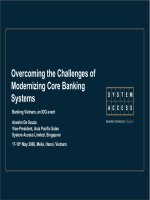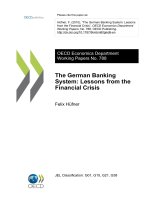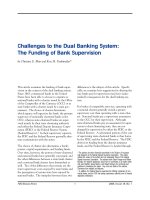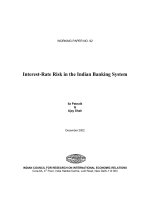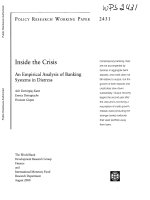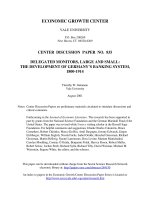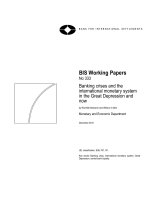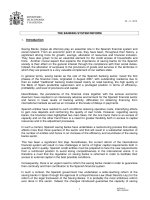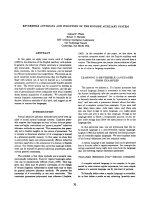the english banking system
Bạn đang xem bản rút gọn của tài liệu. Xem và tải ngay bản đầy đủ của tài liệu tại đây (14.68 MB, 310 trang )
This book is
DUE
o->
the
I"*;!
date
stamped
below
SOUTHERN
BRANCH;
UNIVERSITY
OF
CALIFORNU
LIBRAPY,
61ST CONGRESS
;
:
2d
SESSION
1909-1910
SENATE
DOCUMENTS
Vol,
18
WASHINGTON
: : GOVERNMENT
PRINTING OFFICE : : 1910
1
1'J ib
61st
Congress
|
SENATE
|
^^^^^^^
2d
Session
J
I
No.
492
NATIONAL
MONETARY COMMISSION
The
English
Banking
System
By
HARTLEY
WITHERS
Sir
R.
H.
INGLIS
PALGRAVE
AND
OTHER WRITERS
Washington
:
Government
Printing; Office : 1910
NATIONAL MONETARY
COMMISSION.
Nelson
W.
Aldrich,
Rhode
Island,
Chairman.
Edward B. Vreeland,
New
York,
V
ice-Chairman.
Julius
C.
Burrows, Michigan.
John
W. Weeks, Massachusetts.
Eugene
Hale, Maine. Robert W. Bonynge, Colorado.
PHiLANrER
C.
Knox, Pennsylvania.
Sylvester C.
Smith, California.
Theodore
E.
Burton, Ohio. Lemuel P. Padgett,
Tennessee.
Henry M. Teller,
Colorado.
George F.
Burgess, Texas.
Hernando D. Money,
Mississippi.
Arsene P. Pujo,
Louisiana.
Joseph W.
Bailey, Texas.
Arthur B.
Shelton,
Secretary.
A.
Piatt Andrew,
Special
Assistant to
Commission.
HG
W77e
TABLE
OF
CONTENTS.
THE ENGLISH
BANKING SYSTEM. By Hartley Withers.
Chapter I.
—
The
English System:
Page.
(A)
The Bank of England
3
(B)
The joint-stock
banks
23
(C)
The Scotch
banks
41
(D) The
private banks
50
(E)
The
merchant bankers and accepting
houses.
53
(F)
The postal and trustee
savings banks
58
(G) The
discount houses
61
II.
—
Law
and Custom
in
the
English System
65
(A) The
Bank
of
England
66
(B)
The English
joint-stock banks
78
(C)
The private
banks
93
(D) The Scotch
banks
95
III.
—
The
Banking Business in England
and
Scot-
land:
(A) English
arrangements
99
(B)
Scotch
arrangements
105
(C)
English
banking associations 106
(D) Conclusion
109
IV.
—
The
London Stock
Exchange:
(A) The institution of
the jobber iii
(B)
Constitution
and membership 120
(C)
The
government of the exchange
127
(D) The settlement
and other details 128
(E)
The
official list
132
THE
HISTORY
OF
THE SEPARATION
OF THE DEPART-
MENTS OF THE BANK
OF ENGLAND. By Sir R.
H
Inglis
Palgrave, F. R.
S
149
Chapter I.
—
History
op the
Separation
149
II.
—
Separation op the Two
Departments
and
the
Rate op
Discount
182
III.
—
Correspondence
between the
Government and
the
Bank of England during the
Crises op
1847, 1857,
and
1866
202
IV.
—
Extracts
prom Evidence
and Reports
of
Com-
mittees
OF
the House
of Lords
and the
House
of Commons on the
Division of the
Departments
221
V.
—
Remarks on the
Bank Act
of
1844
by the
late
Dr. N. G. Pierson, sometime
President
of the
Bank of
the
Netherlands
243
I
Natio*nal
Monetary
Commission
Page.
ENGLISH
BANKING
ORGANIZATIONS.
By
Ernest Sykes
262
THE
LONDON
BANKERS
CLEARING
HOUSE.
By
Robert
Martin Holland
267
Table
I.
—Bills,
checks, etc.,
paid at
the bankers
clearing house
in London, 1899-1908
292
II.
—
The
average
daily
clearings,
1868-1908
293
III.
—
Statistics
of the
bankers clearing
house from 1
868-1908
294
THE
ENGLISH
BANKING SYSTEM.
By
Harti^ey
Withers.
Chapter
I.
THE ENGLISH
SYSTEM.
(A) BANK OF ENGLAND.
The distinctive functions of the
Bank of England consist
in its acting as
—
1
.
Banker
to
the British Government.
2. Banker to the joint stock and
private banks.
3.
(a) Sole possessor of
the right to issue
notes which
are legal
tender in
England;
(b) sole
possessor, among
joint stock banks with
an
office in London, of
the right to
issue notes at
all.
4.
Provider of emergency currency.
5.
Keeper of the
gold
reserve for
British banking.
6.
Keeper
of
the gold reserve which is most
readily
available
for
the purposes of international
banking.
These various functions fit
into and supplement one
another, and though their diversity is sometimes
pointed
to as
throwing
too
much responsibility onto one
institu-
tion, it in fact enables
the
Bank to
carry out
its duties
with extraordinary ease, and with the least
possible dis-
turbance to
the financial community. By
the fact that
it keeps
the
balances of
the other banks,
the Bank
of
England is enabled to conduct
the payment of
the interest
on the British debt largely
by
transfers in
its books. By
the fact that it keeps the balances
of the Government and
has
the
monopoly of
the legal-tender note issue,
the Bank
has
a
great
prestige
in the eyes of
the general
public,
which
it communicates to
the other banks
which bank
National
Monetary Commission
with it. There is
an impression
that
the Government is
always behind
the Bank, and that the Bank is always
behind the other banks, and
this feeling
has
certainly
done
much
to
foster the confidence of
the
British
public
in its
banking system.
A
credit in the
books
of the Bank of
England
has
come
to be regarded
as
just as good as so
much gold; and
the
other banks,
with one exception,
habitually
state their
"cash
in hand and at
the Bank
of England" as
one item
in
their
balance sheets, as
if there were no
difference
between an actual
holding
of
gold or legal tender and
a
balance at the Bank of England. It
thus follows at
times when an increase of
currency
is
desirable,
it
can
be
expanded
by
an increase
in the
balances
of the
other
banks
at the Bank of England, since
they thus become
possessed of
more
cash
to be used
as
the basis of
credit.
For currency
in
England
chiefly consists
of checks, and
customers who apply to the banks
for accommodation,
by way
of discount
or
advance,
use it
by
drawing
a
check
which is passed
on and
so creates
a
deposit; and expan-
sion of currency thus consists chiefly
in expansion
of
banking deposits. This expansion is
only
limited by
the proportion between
deposits
and cash which
the
banks
think
fit
to keep,
and
as
long
as
they
can
increase
their
cash by
increasing their credit in the Bank of
Eng-
land's books
the
creation of currency can proceed with-
out let or hindrance. Their balances can be increased
by
borrowing from
the Bank of England, which is gen-
erally carried out not
by
the banks themselves but
by
their
customers
from whom
they have called in loans,
and the Bank of England
is thus enabled to provide
The
English
Banking
System
emergency
currency
with
great ease,
by
means
of loans
and
discounts
which are
used to
swell the balances of
the
other
banks,
which
thus show an
increase of the cash
at
the
Bank
of England
which they
use as a
basis
for
credit
operations.
The elasticity
of the system is
thus
remarkable,
and the
merchants
and
bill brokers of
London
can by
taking
approved
security to
the Bank of
England,
increase
the basis
of English
credit in
a
few
minutes
by
borrowing.
I.
Examining
these
functions
of the
Bank of England
in closer
detail
we
find that
its first and
most obvious
one,
which
originally
brought it into
being, of
financing the
British
Government
and acting as
its
banker,
is
now
per-
haps
its least
difficult and
important
duty. Apart from
the
prestige
which it thus
acquires and
its close
touch
with the
Government and
the officials
of the Treasury,
the
Bank's position as
government
banker
is of little direct
material
advantage.
Its
duties as
such, besides the
nor-
mal relation between a
bank and a
customer, consist
chiefly in making
advances to
the treasury
in the shape
of
"deficiency advances"
when
the
government balances
are too
low
to
admit of the
payment of the
quarterly
interest on the
British debt
without
replenishment, or
against "ways and
means"
advances at
times when the
revenue is
coming in
more
slowly than
government
ex-
penditure is
proceeding. It
also, when
the Government
has to
borrow to
a
greater extent, manages
its issues of
treasury bills, or any
loan
operation
that the Government
may have
to
undertake,
such as
the creation of
fresh debt
in time of war, or the
periodical borrowing
recently neces-
sitated
by the
requirements of the
Irish land-purchase
National
Monetary
Commission
scheme.
The
variations
in the
amount of
the
Govern-
ment's
balance
at
the
Bank of England
are a
question
of great
importance to
the outside
money
market,
because
when
this
balance is
big the result
is
that
a
large
amount
of money
is in
the
control of
the Bank of England,
and
the
resources
of
the outer
market
are thus
curtailed.
It
has
already
been
shown
that the balances
of
the
other
banks at
the Bank
of England
are
treated
by
them
as
cash and
used as
the basis
of
credit.
Consequently
when
the payment
of revenue
on
a
large
scale
transfers
large
amounts
from the other
banks to
the
government
account
in
the Bank of England's
books,
the
outer
market's basis
of
credit is thus
reduced
and money
tends
to become
scarce
and
dear. This is
especially notice-
able
in the last
quarter
of the
financial
year,
January
to
March,
when the
payment of
the direct
taxes (income
tax,
and
house duty)
transfers
many
millions
from the tax-pay-
ing public,
through its
bankers,
to the
national exchequer's
credit at
the
Bank. Between
December
28,
1907,
and
March
27, 1908,
public deposits,
or
government balances, at
the
Bank of England
rose from
£5,625,000
to
£19,843,000
by
the operation
of
this process.
This
transfer
makes
a
gap
in the
basis
of credit
which has to be
filled
up by
bor-
rowing,
and
it is
usual to find
that, according to
the phrase
current
in
Lombard
street, "the
market
is
in
the Bank
"
—
that
is,
the merchants
and
brokers
are borrowing
from the
Bank
of
England
throughout the
greater
part of this quar-
ter of
the
year. When
the
market is
borrowing from the
Bank
it does so
either
by
discounting bills
with it at Bank
rate,
which
is
the official minimum rate of
discount, or
by
taking advances on securities, for
which advances it usu-
6
The
English Banking System
ally
pays
one-half
of i per cent above Bank
rate; and since
Bank rate is,
except
on
quite
rare
occasions,
above
the
rates
for loans and
discount current in
the
outside
market,
it
will be
seen that this
transfer
of revenue
funds
to
the
Government's
balance normally
raises the
current value
of money
during the period in which
it is proceeding.
Dealers
in credit, who are pinched in
by
this
habitual decrease
in the
supply
of
money
at this season,
cry
out against the system, and maintain
that the revenue
ought to be
distributed
among the other
banks until it
is
required
for
government
disbursements
at the end
of the
quarter, in the
same manner as the United
States Treasury
deposits,
when
placed with the
American
banks,
are
divided among
many.
Such a change,
however, would
obviously strike
at the very
basis
of
the
English
system,
which has grown
up
with
all
its anomalies
into
a very
practical and
trustworthy
instrument. If
the Bank
of
England were deprived
of
its privilege of
holding
the
revenue
as paid in, it
would have
to
be remunerated
more
highly,
not only
for the
other
work that
it
does for the
Government, but
also for
performing
other
functions
for
the community, which,
as will
be seen
later,
throw
onto
it
responsibilities
which
hamper
its earning
power
as
a
banker.
If any
alteration
is
necessary
of
an
arrangement
which
causes
chronic
inconvenience
to
dealers
in
credit
during
the
greater
part of
a
quarter of
the
year,
it
would
more
naturally
be found in
a reorganization
of the
system
under
which
most
of the
direct
taxes
are paid
in one
quarter.
It
has
already
been
shown
that
the
position
of the
Bank
of
England
as
government
bank
gives
it
a
prestige
in
the
eyes
of the
public,
which it
passes
on
to
the
7
National
Monetary
Commission
other
banks
which
are its
customers; and a
banking
system
is so
largely a
psychological
matter that
the most
radical
reformer
would hesitate
before making any
altera-
tion which
would tend
to shake
the
basis
of this prestige.
2.
The second
of
the Bank of England's
distinctive
functions
—
its
acting as
banker to
the rest of the English
banking
community
—
is
the
one which throws upon
it its
most
serious
responsibilities
and gives
it most of its actual
power
and ease
in
working.
The Government
gives it
prestige
in
the
eyes
of
the
multitude, which considers
that
governments
are
omnipotent;
the
other
banks
give it the
power
of
providing
emergency
currency
by
making entries
in
its
books, and so
acting as
the easily efficient
center of
a
banking
system
in
which elasticity and
the economy
of gold
are carried to a
perfection
which
is
almost exces-
sive.
Nevertheless, it pays
heavily
for its
apparently
privileged
position as
bankers'
bank. At first
sight
it
would appear
that these
customers,
keeping
a
regular
balance
of twenty-odd
millions, which varies
little
and
on
which the Bank of England
pays
no interest,
were
a
source of
comfortable
income and no
anxiety
to
it. But
in the
first place it is obvious
that a
liability which
is
regarded as
cash by the rest of
the
banking community
requires
special
treatment
by
its custodian,
and in prac-
tice
it is so specially treated
that the Bank of England
maintains
a
proportion
of
cash to
liabilities
which is fully
twice as
high
as that of
the strictest of
the other banks.
This proportion rarely is allowed to
fall below
33
per cent
and
generally ranges between
40
and
50
per
cent,
and
it
need
not be said
that
this
high level of cash
holding tells
heavily on
the earning power of
the Bank of
England.
The
English
Banking System
Moreover,
it is
its position as
bankers' bank
that exposes
the
Bank
of
England
to
the responsibiHty
of maintaining
the
gold
reserve
for
English
banking and being
prepared
to
meet, in
gold, any draft on London
that anyone abroad
who has
acquired or
borrowed
the right to draw
wishes
to
turn into
metal
to
be shipped to a
foreign country.
The amount of
the bankers'
balances is not
separately
stated,
but is
wrapped
up
in
the total of
the other depos-
its
in
the Bank
of England's
weekly
return. It is
believed
to
average
about
22 millions in
these days,
and it is
often
contended
that valuable
light
would be
thrown
on
the monetary
position
if this item were
separated
from
the balances
of the other
customers
of the Bank.
Many
of the
outer
bankers are in
favor of this
change,
but
there
is
a
serious practical
objection to it,
in that a
dangerous
impression
might
be
created in the
public
mind
if
at
any
time it were
seen
that the Bank's cash
reserve
was
below its
liability to its
banking customers;
and
the separate
publication of
the bankers' balances
might thus
check the
readiness
with which
the Bank
of
England
creates
emergency
credit.
Another suggestion
that
is
sometimes
made by
the many critics
of the exist-
ing order of
things in English
banking is
that
the banks
should
keep their cash
reserves
themselves; but
this
very
revolutionary change
would
deprive the system
of
its
two great
advantages, a
centralized organization
with
a
center
which specializes
on the duties
involved
by
acting
as
center,
and
the extreme elasticity
with
which the
present
arrangements
work.
At
the
same
time it must be
admitted
that the system by
which the
other banks
treat
their balances at
the
Bank of England
National
Monetary Commission
as
cash
leads to
the existence of
a
vast amount of "cash
"
in
England
which
on
being looked into is found to con-
sist
of paper
securities
or
promises to
pay.
If
we assume
that
the
proportion of cash held by
the Bank
of England
is
50
per cent
of
its
liabilities—it does not always stand
so
high
—
the other
50
per cent being represented by
securities,
this at once shows
that only half the bankers'
balances
are backed by cash.
And we shall
see
when
we
look into its
weekly
return
that its cash
in
its
bank-
ing
department,
of which the bankers' balances
are
a
liability,
consists
largely of its own notes; and its
own
notes
are backed, to
the extent of
about
one-third, by
securities.
So
that the
actual
gold held against these
bankers' balances
consists
roughly
of about
two-thirds
•of
a
half of
them, or
one-third of their
total.
And
when
it is
considered
that these
bankers' balances are treated
by
the bankers
as
equal to cash
in hand and are
made
the
basis
of credit, on
which they
build liabilities
rang-
ing from five to ten or
even in extreme
cases to
fifty
times
their extent, it becomes evident
that the critics
who maintain
that the multiplication of credit and
the
economy
of gold are carried too far in England
have
a
solid
foundation for their contention.
3.
The Bank of
England's
monopoly of note
issue,
which
once
gave
it the monopoly of joint-stock
banking
in
Lon-
don, is now
a
matter of
comparatively minor importance,
owing to the change
in
English
banking habits by
which
the check has ousted the bank note
for the purpose of
daily commercial payments, and
the regulations which
were
imposed
on
the note
issue by
the bank
act of
1844.
Its
monopoly lay in
the
provision,
which
was
one of its
The
English Banking
System
early
privileges, that "it shall not be lawful for any body
politic
or corporate whatsoever,
or for
any other
persons
whatsoever,
united or to be united,
in
covenants or part-
nerships
exceeding the number of six persons, in
that
part of
Great
Britain
called England,
to borrow,
owe, or
take
up
any sum
or
sums
of money on their bills or
notes
payable at
demand." This monopoly
was
conferred
on
the Bank
in
1706
and was
maintained until
1826,
when
the implied monopoly in
joint-stock banking
was
re-
stricted to
a
65-mile
radius
around
L-ondon.
In
1833
joint-stock
banks were established in
London
itself, since
it had been discovered
that the Bank of
England's alleged
monopoly only reserved to it
the privilege
of note
issue,
and
the private bankers in London had already
found
that it was
more convenient to banker
and customer
to
work by the system
of deposit
and check.
By
this
system
a
customer who took
a
loan
from
his banker
did not carry
it away
with him
in
the form of
notes, but was given
a
deposit or credit in the bank's books and the
power of
drawing
checks against
it. The development
of this
sys-
tem has made money
in
England
mean,
as a
rule,
a credit
in the books
of
a
bank which enables its holder
to draw
checks, and has
made checks the chief
currency of the
country.
The
development of this system was quickened
by the
provisions
of Peel's Act of
1844,
which, under the
influence
of banking disasters that
had
arisen out of reckless
note
issuing
by private banking
firms in the
counties, laid
down
an iron rule for the regulation of note
issues
in
England.
None of the other
note issuers were allowed to increase
their
issues under any circumstances, and the Bank of
National
Monetary
Commission
England,
for every additional note
issued beyond
£14,-
000,000,
was to
hold metal
in
its
vaults. Under the
terms
of Peel's
Act one-fifth of
this metal might
be silver,
and
in
the early returns issued by
the Bank
under the
act
a
certain amount of silver
is found among the
assets
of the
issue
department.
In
the
firist
return
issued, for
example,
which
was
dated
September
7,
1844,
the
total note
issue
was
£28,351,000,
which was
backed
by
£14,000,000
in
securities,
£12,657,000
in gold coin
and
bullion
and
£1,694,000
in silver. But
since
1853,
no
silver has
been
held
in
the issue
department of
the Bank,
and in
1897,
when
the influence of
the bimetallists on
the existing
Government
led
to
a proposal
that the proportion
of
sil-
ver allowed
by
law should be
held
by
the Bank
as
back-
ing
for
its
note issue,
public opinion expressed
itself
so
vigorously
that
the
suggestion
was promptly
buried.
The Bank's fiduciary note issue,
thus fixed at
£14,000,000,
was
only
allowed to increase by
the
lapse
of the
issues
of
the existing issuers,
the
Bank
being empowered
to
increase
it
by
two-thirds
of the amount
lapsed. The
lapsing process
has proceeded steadily by
the
amalgama-
tion of
country banks
with banks which have
London
offices and so
are prohibited by
the
Bank's monopoly.
And the
Bank's fiduciary
issue
has thus been raised
from
the original
£14,000,000
to
£18,450,000.
Above
this
line it can not go except by
means
of
the
sus-
pension
of
the bank
act,
which has been found
neces-
sary
occasionally in times of panic,
the last of
such
occasions
having occurred in 1866.
The
English
currency
system is
thus,
as
far as
the
law can
rule
it,
entirely
inelas-
tic, but
it has already been
shown that even when the
The English
Banking
System
law of
1844
was
passed, the check currency,
over
which
the
law
exercises no restriction, was aheady driving out the
note, and banks without any right of note
issue had been
1
1
years
estabHshed in
London.
The Bank
of England's note
issue
is
now chiefly
used
by
other
banks
as
"till money,"
or part
of the store of legal-tender cash
they
keep to meet
demands
on
them. It has thus
become
part of the
basis
of credit in
England, since
the other
banks
roughly
base
their operations on their holding of
cash
in hand and at
the
Bank of
England.
Their cash
at
the Bank of
Eng-
land has already been discussed above;
their
cash in
hand
consists
of coin and notes, and since the
latter have
thus become part of
the
foundation on
which the deposit
liabilities of
the other
banks
are
based,
there
is
reasonable
ground for
the
contention often put
forward
by
practical
expert critics of
the
English system,
that the fiduciary
note issue
should
be
reduced
by
the repayment by
the
Government
of the whole or part of a Government debt
of
£11,000,000
to the Bank, which backs
the greater
part
of it,
and its replacement by
gold.
It is
evident that the
amount of metallic backing
for
a note issue
which
is
intended
to
circulate
as
currency
is a
different matter
from
that required in the
case
of a note issue
which
is
held
by
bankers
as a
reserve and used by
them
as a
founda-
tion for a
pyramid of credit operations.
4.
By
the
ease
with which
the
Bank of England
pro-
vides emergency currency
it
gives
the English
banking
system the
great
advantage of
extreme elasticity and
adaptability
;
and
it
is
enabled to
do
this
by
the fact
that
it
acts as banker to
the other
banks, and
that every credit
which
they have in its books is
regarded
by
them and by
13
National
Monetary
Commission
•
the
rest
of
the
community as
"cash"
to be
taken as
prac-
tically
equal to
so
much
gold.
This cash
at
the Bank
of
England
in
the hands of
the
rest of
the
bankers
can be
multiplied as
rapidly as
the Bank
of England
is prepared
to make advances,
and as
the
mercantile and
financial
community can
bring it
bills for
discount or
securities
to
be
borrowed on.
There is
no
legal
restriction of
any sort
or
kind, and
the close relations between
the Bank and its
borrowing
customers enable
the necessary operations to
be
carried
through
with
a
celerity which is unrivaled,
at
any
rate
in
the Eastern
Hemisphere. The
process works
as
follows
: In
every English
bank balance
sheet there will
be found
an
item
among
the
assets
"cash at call
or short
notice,"
though
in
a
few cases
the slovenly
habit
is adopted
of
including
this entry
along
with the cash in hand. This
"cash," as
it is
called, really consists
chiefly
of loans made
by
the
banks to
the discount houses, and regarded
by
the
banks as
the most liquid of
their
resources.
As such, it
is at once
made use of
when for
any
reason,
such as the
many
payments
which have to
be
made
on quarter
days,
or
the end of
the half year when the preparation
of balance
sheets by
firms and companies
requires an abnormal
amount of cash for more or
less
ornamental
purposes,
the
banks are
subjected to extra pressure
by their customers,
who both
withdraw
actual currency from them for
smaller
payments, and
require
advances in order to
show cash
with bankers in
their
balance
sheets.
The banks in order
to meet this
pressure,
and at the
same time to preserve
an
adequate
amount of
cash
in
their
own statements,
call
in
their
loans
from the
discount
houses; the discount houses,
at a
point,
can
only
repay
14
The English Banking
System
them by
borrowing
from the
Bank of
England and trans-
ferring
the credit raised
with
it to
the
bankers,
whose
cash
at
the
Bank of England is thus
increased. This
book
entry
takes the place
in their
balance sheets
of the legal-
tender
cash that their customers
have withdrawn,
and is
used as
the basis for the increased
deposits that have
been
created
by
the loans of the
bankers to their
customers for
ornamental
purposes. Similarly
at
the
time
of year
when
the transfer of
the
taxes to the
Government's
balance
reduces
the cash at the Bank of
England held
by
the other
banks
the
gap
is filled
by
the
loans made
by
the Bank
of
England
to the customers
of
the
other banks.
In
short,
by
discounting
and making
advances the Bank
of
Eng-
land can
at any time create book
credits, which
are
regarded
as cash by
the
English banking community,
and
on which
the
latter
can
base the credits which
give the right
to
draw checks, which are the most important
part of the
English
currency. The extent
to which the
Bank
of
England can create
this credit
is
a
matter
for its
own
discretion, but any
creation
of
it
diminishes the
propor-
tion that it shows
in its
own
weekly returns
between
its
reserve and liabilities. Consequently when
it is
applied
to for
amounts which bring that proportion
too low
the
Bank of England
has to take steps to reinforce
its
cash
reserve.
5.
It has
been shown that the Bank of
England
keeps
the
balances of
the other banks, and from
this it follows
that the latter look to it for gold or notes at times when
the local commercial community requires an extra supply.
At
the
end of every month,
especially
at the ends of
the
quarters
or at times of
national
holidays, the Bank's note
76651—10
2
15
National
Monetary
Commission
circulation
expands
and coin
is
taken from it.
The
duty-
is
thus
thrown
upon
it of
keeping an
adequate
supply of
cash
for
home*
purposes,
and,
as has
been
already
stated,
its
normal
proportion
of cash
to
liabilities is very
much
higher
than
that of
the
other
banks.
But
these move-
ments
are
tidal and
regular,
and
hough
times of active
trade
increase
slightly
the
demand
for coin
and note cur-
rency
in
England,
the
extensive
and
ever-growing
use of
the
check
reduces
the
importance
of
this
part of the
Bank's
duties.
6.
Much
more
important
is the
Bank
of England's
duty
as
custodian
of
the
gold
store
for
international
banking.
London
is
the
only European
center
which
is always
pre-
pared to
honor
its
drafts
in
gold
immediately
and to any
extent.
The
Bank
of
France has
the
right to
make
pay-
ments
in
silver,
and uses
it by
often
charging a
premium
on
gold,
sufficient
to
check
any
demand
for it; and in
other centers
measures
are
taken
which
make
apparently
free
convertibility
of
credit
instruments
optional
at
the
choice
of
the
central
bank.
Consequently
the
Bank of
England
has
to be
prepared to
meet
demands on
it at
any
time
from
abroad,
based
on
credits
given
to
foreigners
by
the
English
banking
community,
and
it has
thus to
observe
the signs
of
financial
weather
in
all parts
of
the
world
and to
regulate
the price
of money
in London
so
that the
exchanges
may
not be
allowed to
become
or
remain
adverse
to a
dangerous
point.
The
difficulties of
this task
are
increased
by
the
extent to
which the
English
banking
community
works
independently
of it, by
ac-
cepting
and
discounting
finance
paper, and
giving
for-
eigners
credits
at
rates
which
encourage
their further
i6
The
English Banking
System
creation.
For the low and
wholly
unregulated
proportion
of cash
to
liabilities on which English banking
works,
enables
the other banks to
multiply
credits
ultimately
based on the
Bank of England's reserve, leaving
the
re-
sponsibility
for
maintaining the reserve to the Bank. This
it does by
raising its rate
when necessary, and so,
if
it has
control of the
market
and
its rate is
"
effective
"
—
a
phrase
which will
be
explained later
—raising the general
level
of
money rates in London.
When its rate is not
effective, the Bank of England
finds
itself obliged to
intervene in the outer
money market
—
consisting of
the other banks and
their customers
—
and
control
the rates
current in it.
This it
does by
borrowing
some
of
the
floating
funds in
this market,
so
lessening
their supply
and
forcing
up
the price
of
money. By
means of
this borrowing
it diminishes the balances
kept
with it
by
the other banks,
either directly.
or
indirectly
—
directly
if it borrows
from them,
indirectly if it borrows
from their customers
who hand
the advance to
it in the
shape of a
check on
them. The result
is that
so
much
of
the "cash
at the Bank of England,"
which the
English
banking community
uses as part of
its basis of
credit,
is
wiped
out, money—
which in London
generally means
the price at
which the
bankers are prepared to lend for a
day
or for a
short
period to the discount houses—becomes
dearer, the market
rate of discount
consequently tends to
advance,
the foreign
exchanges move
in favor of London,
and
the tide
of gold
sets
in the direction of
the Bank of
England's vaults,
and it
is enabled to
replenish its
reserve
or
check
the
drain on
it.
That the Bank of England
should
have to
go
through
this clumsy ceremony of
borrowing
17
National
M
on
et
ar
y
Commission
money
that it does not want,
in order to deprive the outer
market of a
surplus which depresses
discount
rates
in
a
manner
that
is dangerous
owing to its ejffect on the foreign
exchanges, arises
from the want of connection between
bank rate and
market rate.
In
former days the
London
money
market never had
enough money to work
with
without help from
the Bank
of England.
Bagehot, in
his
great
work on
Lombard
street, published in
1873,
says
that
'
' at all
ordinary moments there is not money enough
in Lombard
street to
discount all the bills in
Lombard
street
without taking some
money from
the Bank of
England."
As
long as
this
was so,
Bank rate—the price
at
which
the bank
would discount bills—
was
at
all
times an import-
ant
influence on the
market rate.
Since
then,
however,
the
business of
credit making
has
been so
quickly
and skill-
fully
extended
that
Lombard
street is
frequently
able to
ignore Bank rate,
knowing that it
will
easily be able to
supply
its needs from the
other banks, at rates which are
normally
below it. Currency
in
England
consists
of
checks
drawn against
deposits which are
largely created
by
the
loans and discounts
of the other banks. There is
no
legal
limit whatever
on the extent to
which
these
loans
and discounts
can be multiplied,
and the only
limits im-
posed
are those
of publicity, which is
applied rarely in
all
cases
and in
some
not at
all, and of the
prudence with
which the banks conduct
their business.
Hence it follows
that competition between the
banks often
impels them
to
continue
to
make
advances
or
discount
bills
at
low
rates
when the Bank of
England,
as
custodian of
the
English
gold reserve, thinks it advisable
in the interests of
the
The
English
Banking
System
foreign
exchanges
to
impose a
higher level.
This it
does
by
borrowing
some of
the credit
manufactured by the
other
banks,
in
order to create
artificial
scarcity
of
money, and
make
its
own official
rate effective.
It thus
appears
that
the Bank of
England's
official rate
is
often
through
long periods
a
mere empty
symbol,
bear-
ing
no
actual
relation to the
real price of
money in
Lon-
don;
and
only becomes
effective, and a
factor
in
the
monetary
position (
i
)
when the trade demand
for
credit
is
keen enough
to
tax the credit-making
facilities
of
the
other banks to
their full extent,
(2)
when
the pay-
ment of taxes
transfers large sums
from the
other
banks to
the Government's
account at
the
Bank of
England, so
reducing
the
"cash
at the
Bank" on
which
they
build credit
operations, and
(3)
when, owing to
foreign demands
for gold, the
Bank of
England
takes
measures, by
borrowing, to
restrict credits in
the open
market and
to make its
rate effective.
In other
re-
spects
its official
rate differs
materially from the rates
quoted by
ordinary dealers
in credit. It does not
fluctu-
ate according to
the
supply
and
demand for bills, but is
regularly fixed once a
week at
the meetings of the Bank of
England
court on Thursday
morning. It is
extremely
rare for any change to be
made in the
Bank
of England
rate on any day except
Thursday. Instances
occur rarely
when
some
sudden change
of position makes
it essential,
as at
the end
of
1906,
when the Bank rate was raised to
6
per cent on
a
Friday
morning. In normal times
the
rate
which
is fixed on one
Thursday "is maintained
until the
next,
though the rate is
only
a
minimum
and
the Bank of
England occasionally takes
advantage of
this
fact and
19
